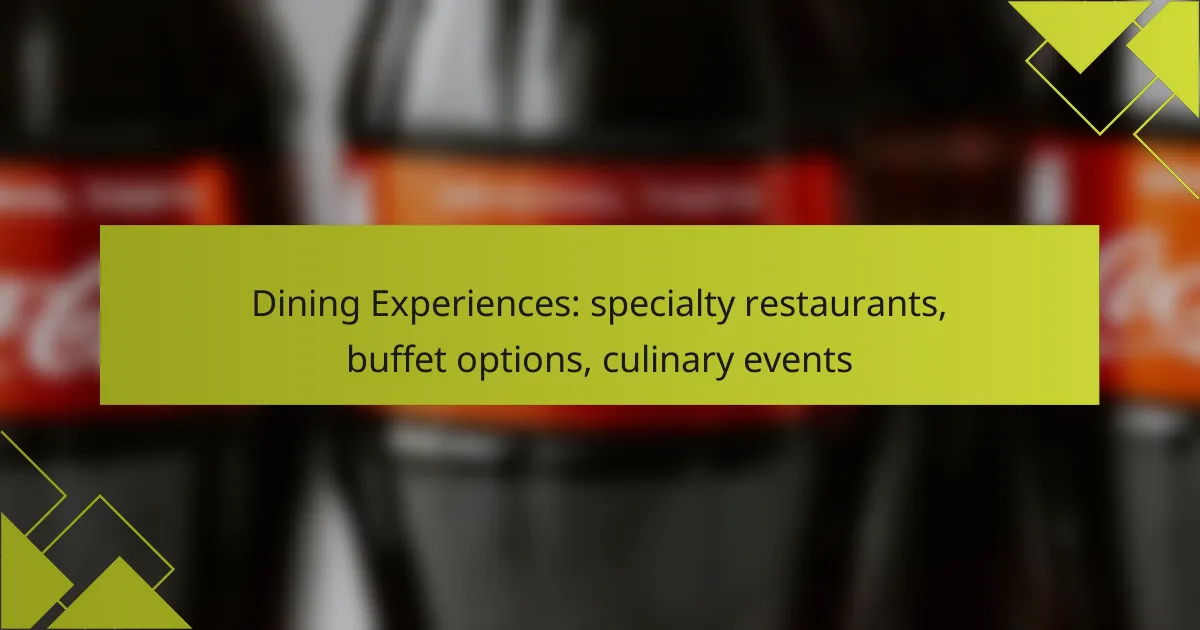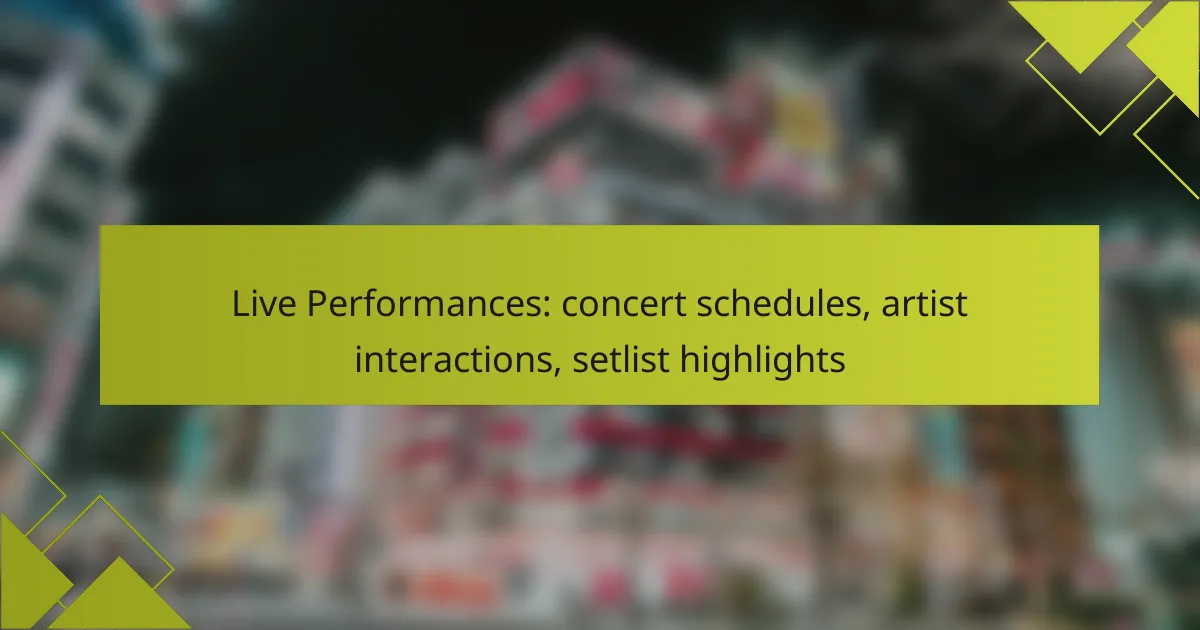Onboard activities such as games, contests, and trivia nights play a crucial role in fostering teamwork and building camaraderie among participants. These engaging experiences not only enhance communication but also create a fun atmosphere that encourages team members to connect and collaborate effectively.
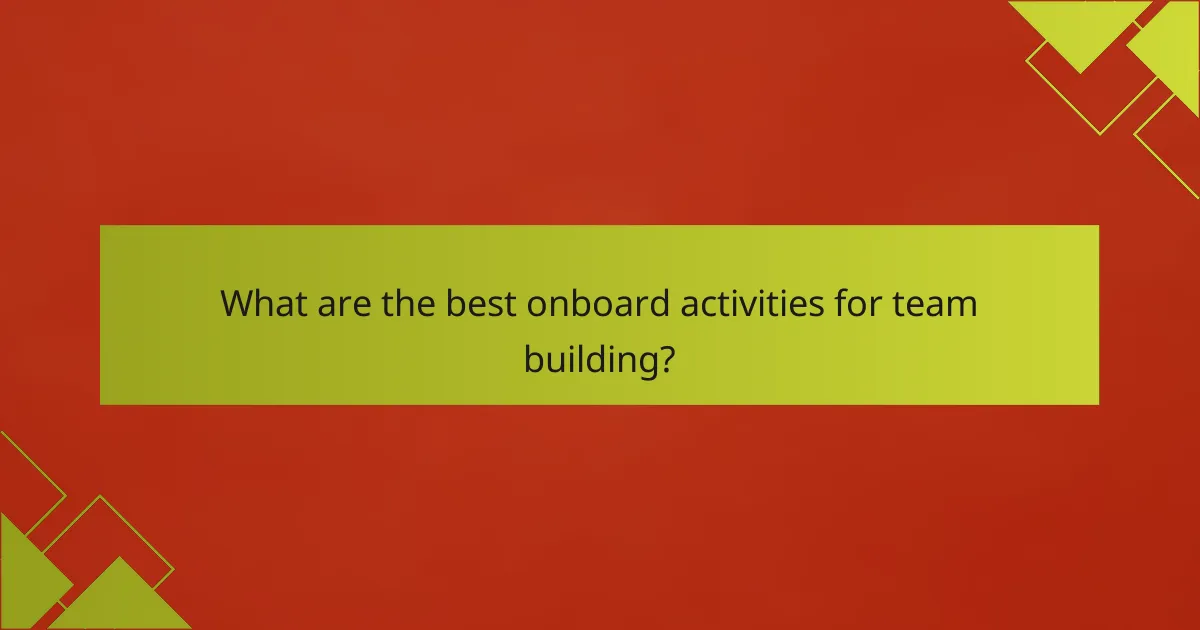
What are the best onboard activities for team building?
The best onboard activities for team building include engaging games, contests, and trivia nights that foster collaboration and camaraderie among participants. These activities not only enhance communication but also create a fun and relaxed environment for team members to bond.
Team trivia nights
Team trivia nights are a fantastic way to encourage friendly competition while testing knowledge across various topics. Participants can form teams and answer questions ranging from pop culture to industry-specific facts, promoting teamwork and collaboration.
To organize a trivia night, prepare a mix of easy and challenging questions, and consider using a quiz app for a more interactive experience. Aim for a duration of about one to two hours to keep energy levels high and engagement strong.
Interactive games
Interactive games, such as charades or Pictionary, are excellent for breaking the ice and stimulating creativity. These games require participants to work together, enhancing communication and problem-solving skills in a fun setting.
Choose games that can accommodate varying group sizes and skill levels. Ensure that the rules are clear and that everyone has a chance to participate, which helps to foster inclusivity and team spirit.
Scavenger hunts
Scavenger hunts can be tailored to the onboard environment, encouraging teams to explore and collaborate. Participants can search for specific items or complete challenges, which promotes teamwork and strategic thinking.
When planning a scavenger hunt, create a list of items or tasks relevant to the location and set a time limit to keep the activity lively. Consider incorporating clues that require teamwork to solve, further enhancing collaboration.
Icebreaker contests
Icebreaker contests are designed to help team members get to know each other better in a relaxed atmosphere. Activities like “Two Truths and a Lie” or team-building exercises can facilitate conversations and build rapport.
Keep these contests light-hearted and brief, allowing everyone to participate without feeling pressured. Aim for a mix of fun and insightful activities to ensure that all team members feel included and valued.
Workshops
Workshops provide an opportunity for skill development while fostering team collaboration. These can range from professional development sessions to creative workshops, depending on the team’s needs and interests.
When organizing a workshop, focus on interactive elements that encourage participation. Consider inviting a facilitator who can guide discussions and activities, ensuring that all team members benefit from the experience.
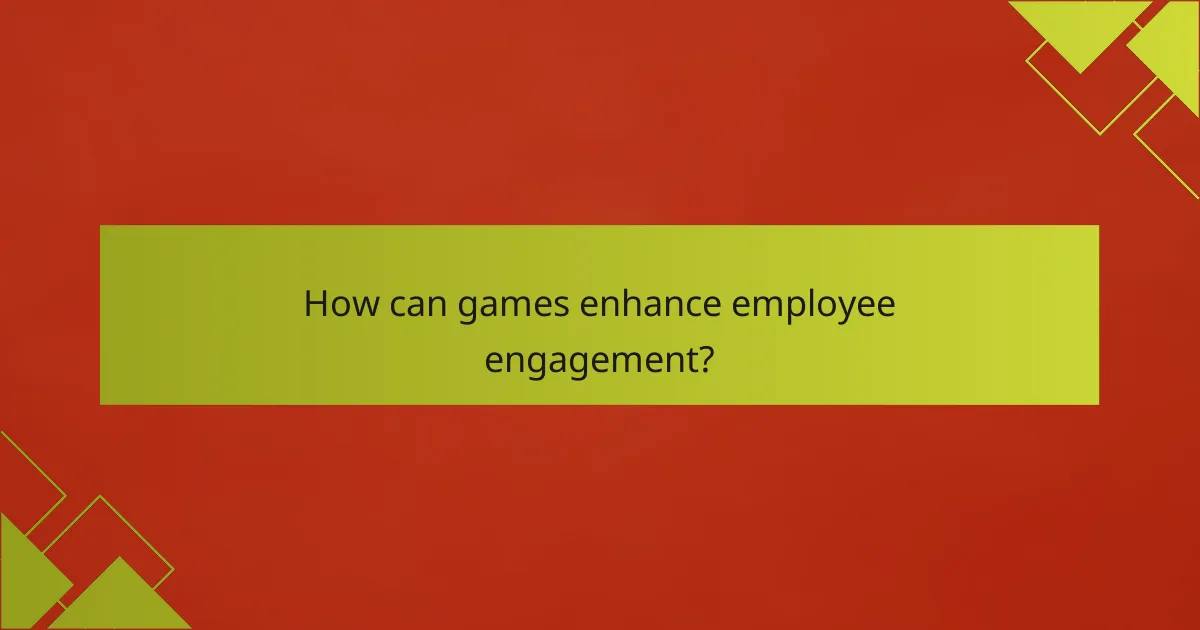
How can games enhance employee engagement?
Games can significantly enhance employee engagement by creating a fun and interactive environment that motivates participation and fosters connections among team members. By integrating games into the workplace, organizations can improve morale, collaboration, and creativity, leading to a more cohesive and productive team.
Boosts morale
Incorporating games into the workplace can lead to a noticeable boost in employee morale. Fun activities provide a break from routine tasks, allowing employees to unwind and recharge. This uplift in spirits can translate to higher job satisfaction and lower turnover rates.
Consider organizing regular game sessions, such as trivia or team challenges, to keep the atmosphere lively. Simple games can be effective, requiring minimal setup while still engaging employees and promoting a positive workplace culture.
Encourages collaboration
Games often require teamwork, which encourages collaboration among employees. When individuals work together to achieve a common goal, they strengthen their relationships and build trust within the team. This collaborative spirit can lead to improved communication and problem-solving skills.
To maximize collaboration, choose games that require diverse skill sets, allowing team members to leverage each other’s strengths. Activities like team-building exercises or group challenges can help break down silos and foster a sense of unity.
Fosters creativity
Engaging in games can stimulate creativity by encouraging employees to think outside the box. When individuals are in a relaxed and playful environment, they are more likely to generate innovative ideas and solutions. This creative thinking can benefit the organization in various ways, from product development to marketing strategies.
Incorporate games that challenge employees to brainstorm or create, such as design contests or improvisational activities. These types of games can unlock new perspectives and inspire fresh approaches to work-related challenges.
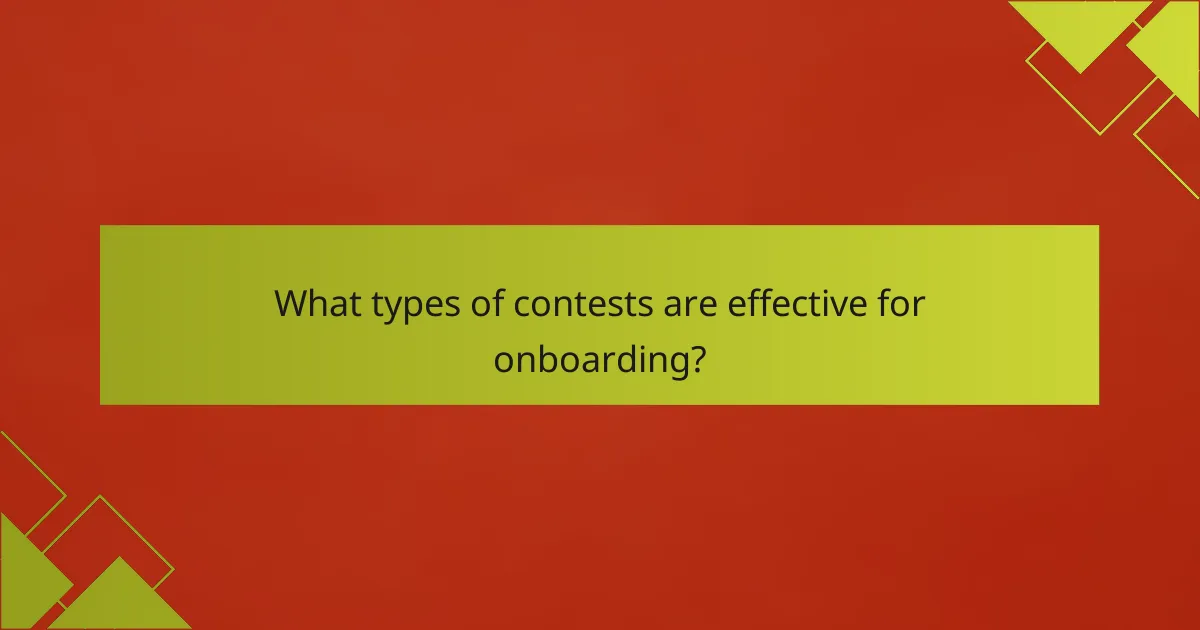
What types of contests are effective for onboarding?
Effective onboarding contests engage new employees and foster team bonding. Popular options include photo contests, team challenges, and skill-based competitions, each offering unique benefits to enhance the onboarding experience.
Photo contests
Photo contests encourage creativity and personal expression among new hires. Participants can submit images that reflect their interests or experiences related to the company culture, which can be shared on internal platforms.
To run a successful photo contest, establish clear themes and guidelines. For example, you might ask employees to capture moments that represent teamwork or innovation. Offer small prizes, such as gift cards or company swag, to motivate participation.
Team challenges
Team challenges promote collaboration and communication among new employees. These contests can involve problem-solving tasks, scavenger hunts, or escape room-style activities that require teams to work together to succeed.
When organizing team challenges, consider the size of the groups and the complexity of the tasks. Aim for diverse teams to encourage interaction across departments. Providing a fun and competitive atmosphere can significantly enhance the onboarding process.
Skill-based competitions
Skill-based competitions allow new hires to showcase their abilities in relevant areas, such as coding, design, or sales pitches. These contests can help identify strengths and areas for development while fostering a sense of achievement.
To implement skill-based competitions, define clear criteria for judging and ensure that the tasks align with the company’s goals. Offering constructive feedback and recognition can enhance the learning experience and motivate employees to improve their skills further.
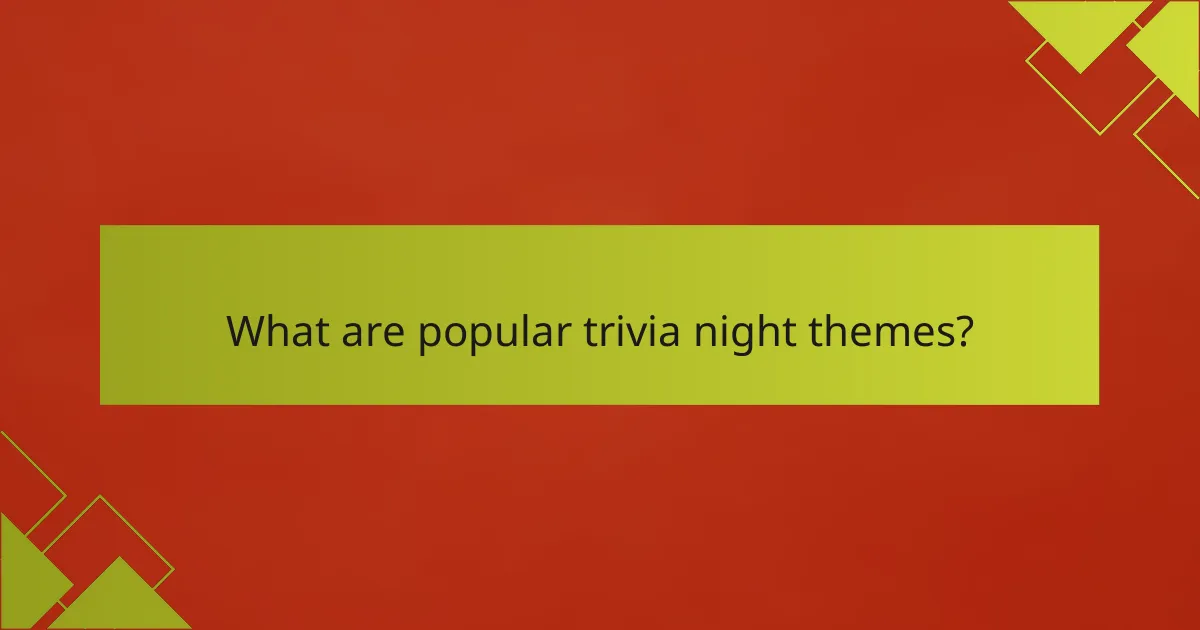
What are popular trivia night themes?
Popular trivia night themes often revolve around engaging and relatable topics that encourage participation. Themes can range from pop culture to company history, providing a fun way to test knowledge and foster camaraderie among participants.
Pop culture
Pop culture trivia nights focus on contemporary topics such as movies, music, television shows, and celebrities. These themes resonate with a wide audience, making them ideal for casual gatherings. Questions can include identifying song lyrics, recalling movie quotes, or naming popular TV characters.
To enhance engagement, consider incorporating multimedia elements like audio clips or video snippets. This approach can make the trivia experience more dynamic and entertaining.
Company history
Company history trivia nights allow employees to learn about their organization in a fun way. Questions may cover key milestones, founding members, or significant achievements. This theme not only tests knowledge but also reinforces company culture and values.
To prepare, gather interesting facts and anecdotes that highlight the company’s journey. This can spark discussions and foster a sense of pride among employees.
Industry knowledge
Industry knowledge trivia nights challenge participants to demonstrate their understanding of the field in which they work. Questions can range from technical terms to major trends and innovations. This theme is particularly useful for professional development and team building.
When organizing, ensure the questions are relevant and varied in difficulty to cater to different levels of expertise. This can help maintain interest and encourage learning among all participants.
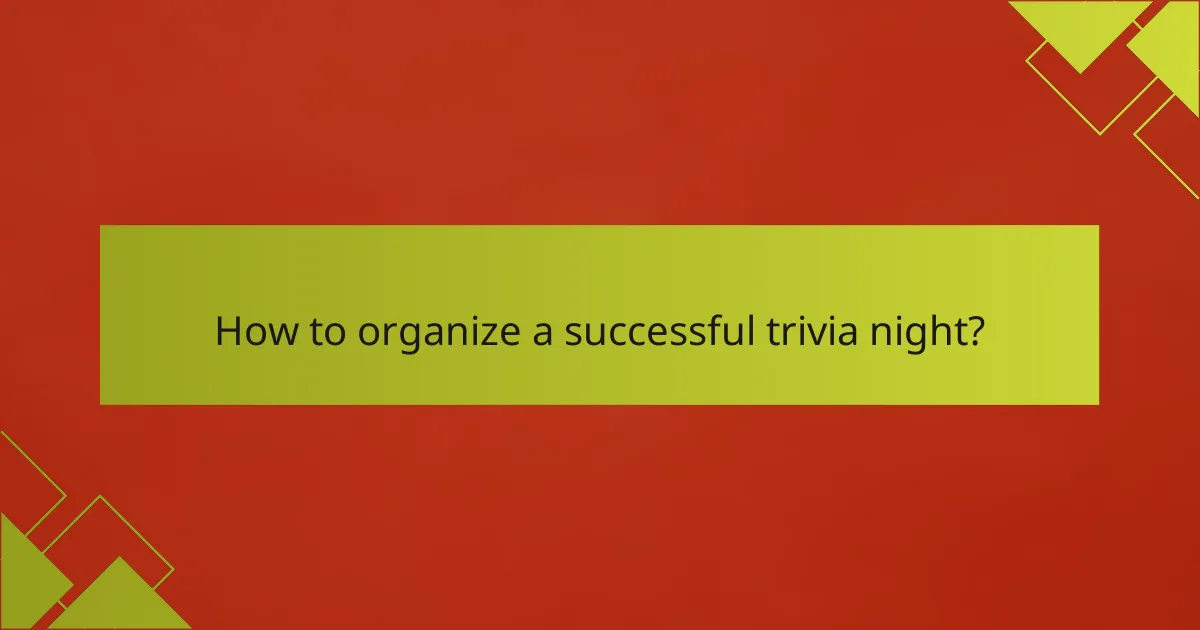
How to organize a successful trivia night?
To organize a successful trivia night, focus on creating an engaging atmosphere with well-structured questions and a clear format. Consider your audience’s interests and ensure the event is interactive and fun.
Choose a platform
Selecting the right platform is crucial for a trivia night. Options include in-person settings, online platforms, or hybrid models. Popular online platforms like Zoom or Kahoot! can facilitate remote participation, while in-person events may benefit from a local venue that can accommodate your audience comfortably.
When choosing a platform, consider the technical capabilities of your participants. Ensure that everyone has access to the necessary technology and understands how to use it. Test the platform beforehand to avoid technical issues during the event.
Set clear rules
Establishing clear rules helps maintain order and ensures everyone understands how the trivia night will proceed. Outline the format, including the number of rounds, time limits for answering questions, and scoring methods. For example, you might award points for correct answers and offer bonus points for speed.
Communicate these rules to participants before the event starts. Consider creating a simple handout or a slide presentation that summarizes the rules to ensure everyone is on the same page. This can help prevent confusion and disputes during the game.
Engage a host
A charismatic host can significantly enhance the trivia night experience. Choose someone who is comfortable speaking in front of a crowd and can keep the energy high. The host should be able to read questions clearly, manage the timing, and interact with participants to keep them engaged.
Consider involving the host in the question creation process to ensure they are familiar with the content. A well-prepared host can adapt the event flow based on audience reactions, making the trivia night more enjoyable for everyone involved.
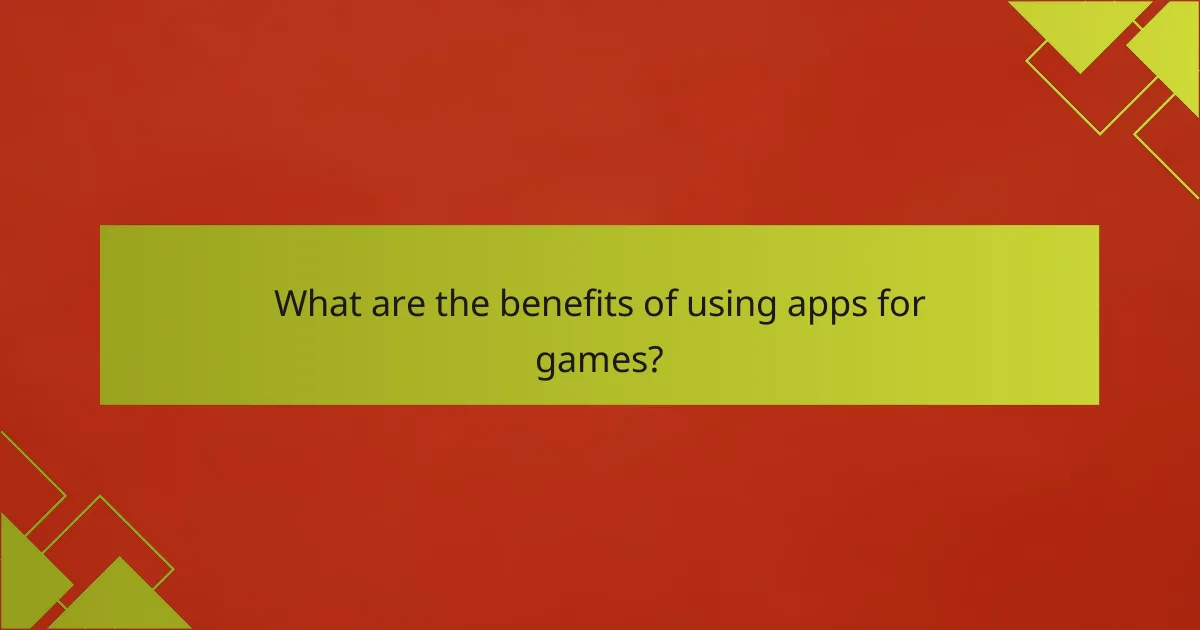
What are the benefits of using apps for games?
Using apps for games offers convenience and engagement, allowing players to access various activities easily from their devices. These apps often enhance the gaming experience with interactive features, social connectivity, and real-time updates.
Easy access
Apps provide easy access to games anytime and anywhere, making it simple for players to join in on the fun. Users can download games directly to their smartphones or tablets, eliminating the need for physical game boards or equipment.
Many gaming apps are designed to be user-friendly, featuring intuitive interfaces that allow players to navigate quickly. This accessibility encourages participation, whether for casual play or competitive contests.
Additionally, apps often include features like notifications and reminders, ensuring players stay engaged and don’t miss out on events like trivia nights or contests. This can significantly enhance the overall gaming experience.


